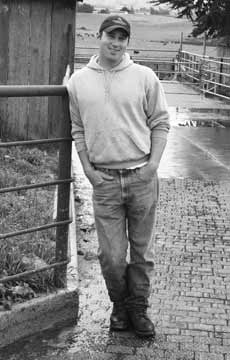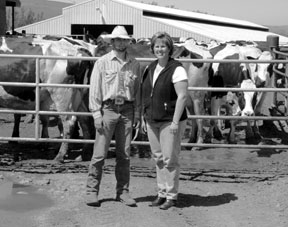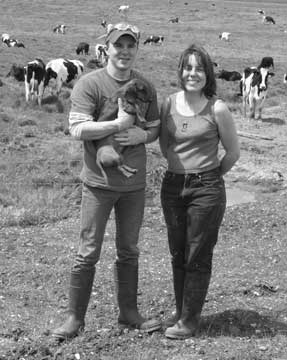New kids on the block
The next generation moves into organic dairying
“Taking our dairy organic has allowed me to stay in the dairy business,” says Jarrid Bordessa from Valley Ford, “It’s given me a chance to keep doing what I love most, dairying.” Looking over Jarrid’s family operation, it is obvious that he takes organic transition and production seriously. With organic milk checks twice that of conventional, transition to the lucrative new market has become a serious issue, and the Bordessa enterprise shows that it can be done in a simple, well-run operation. Jarrid, along with newly minted organic dairy farmers Dayna Wilson Ghiradelli, her brother Howard Wilson, Robert McClelland, and Jolynn Mendoza, make up the school of young farmers who are taking on organic production and helping to develop the emerging industry. 
It makes sense. The organic phenomenon is now becoming a mainstream force, no longer just a fringe fad. The organic dairy industry value last year was $1.3 billion and the fresh fluid milk portion was half of that, at $666 million. It appears there is a real future in organic dairy, and the future belongs to this new breed of dairy operators.
Young third-and fourth-generation dairy farmers are embracing it with clearheaded and forward-looking enthusiasm. “At first we were a bit nervous,” says Jarrid, with a characteristic soft understatement. “We really didn’t know what to expect.” Running the operation with his father, Gary, he quickly dialed into organic management. “We found out that organic is not much different from the way most of us run our dairies anyway. We are more careful with the cows, and try to prevent problems before they get out of hand.”
Organic operators forgo the tools of the conventional industry, like the standard use of antibiotics, fly sprays, and non-approved medical treatments. Preventative practices have replaced conventional treatments. “We watch the cows closely and work to keep them from getting sick,” says Jarrid.
One of the biggest challenges facing organic dairy farmers is finding organic feeds. The current demand has put the squeeze on suppliers, and rising energy costs for transporting organic feed stock long distances don’t help the situation. Farmers like Jarrid are already looking at lowering feed bills by optimizing the productive
pastures surrounding the dairies. He is planning on boosting his grass production with more rotations and more intense management. It’s refreshing to see a young operator with such an optimistic, forward-looking attitude.
Just down the road from Jarrid, the Diamond W Dairy spreads across the valley. This is a family farm, under the stewardship of Ken Wilson and his brother Ron Wilson, with the organic production and marketing under the management of Dayna Wilson Ghirardelli and her brother Howard. If you know anything about the dairy business, you can tell a well-run operation the minute you walk onto the farm. Clean, smoothly run, and populated by glossy fat cows who are treated like queens, the Diamond W fits the description. 
The experiment in organic falls to Dayna and the cow management to Howard. Dayna’s enthusiasm has helped carry the project forward. Although cautious, she is obviously excited about the introduction of organic into the longstanding family operation. “I think we can make it with organic. We still have a lot to learn, but I can see a future in it. Organic production fits right in with how we operate. We were almost there anyway with our conventional dairy,” Dayna said recently.
Her brother, Howard, takes care of the cows in the split herd operation. He’s an authentic lifer and it shows in his quiet but intense approach to management and detail. As for the organic transition, Howard is acutely aware of a basic fact that escapes most people, “You know, organic is not that much different from the way all of us manage anyway. We take both our operations seriously, and produce good food from both.” With the complex regulatory environment and escalating feed and input costs facing the industry, both Dayna and Howard are willing to experiment with the more lucrative organic production. “We are already set up to transition,” says Dayna, “and we are excited to see how it turns out. The integrity involved is important to us; we work hard to meet the organic standard.”
Robert McClelland and his fiance, Jolynn Mendoza, have taken over Coopers Dairy in Bloomfield and converted it to organic. Both of these young farmers come from long-established dairy families. Like Jarrid and Dayna, Jolynn agrees that this new wave of organic dairy production can help young farmers. “We are able to get a fair price for our milk. This gives us more room for improvements, and room to take good care of the cows,” says Jolynn. They have rebuilt the milking barn and are working on the calf raising program, which is Jolynn’s specialty.
Jolynn was already a skilled and sensitive manager of cow health before the organic enterprise took off. Her skills fit perfectly into the organic model. “Keeping the cows healthy is the goal. We avoid stressing the animals, and feed them simple nutritious diets of grass, hay, and organic grains. Our system is low stress; the key is prevention, prevention, prevention.” This is a young crew. Robert and Jolynn have hired Jolynn's brother, Jarrod. The combined age of this crew is about the age of your average dairy farmer! 
There is an optimistic energy generated by these young people that is refreshing in an industry so often challenged by steep fluctuations in pricing and an aging population of producers. These kids are not just “getting by,” but are making long-range plans and commitments to their dairies. The burgeoning consumer demand and the resulting price premiums offered through organic milk production have broadened future prospects for Jarrid Bordessa, Dayna Wilson Ghirardelli, her brother Howard, and Robert McClelland and Jolynn Mendoza.
Building on decades of north coast dairy experience inherited from their families, these young farmers are reaping the fruits of the efforts of generations of hard-working parents and grandparents. Organic production has given them breathing room, and more importantly, the respect and remuneration that all of our local dairies deserve. The USDA Organic Certification seal has raised the bar for producers. Signing on adds value to the product, and showcases the production of good, rich organic milk from healthy, pastured cows under careful and professional management. This is what the new consumer is demanding today. It fits perfectly into our north coast model of sustainable farming.



